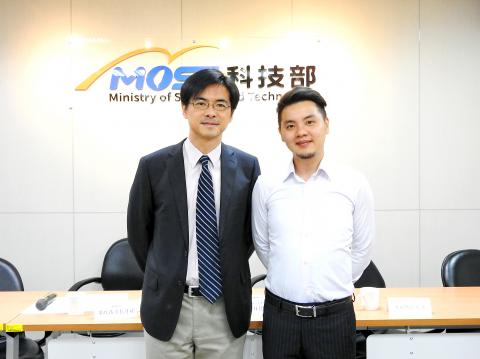Introducing transit-amplifying cell (TAC)-derived progenitor cells in the anagen phase of hair follicle regrowth has seen success in animal trials, which would mean patients undergoing chemotherapy or radiotherapy would not lose as much hair, a National Taiwan University team has said, adding that a commercial product could be developed within a decade.
The research was first published in the scientific journal Cancer Research last year.
Follicles mobilize ectopic progenitors from genotoxicity-sensitive TAC compartments to accelerate regeneration and compensate for the severity of dystrophy induced by ionizing radiation, the paper said.

Photo courtesy of the Ministry of Science and Technology
However, how genotoxicity-induced hair follicle injury is repaired remains unclear and there is still no effective treatment for genotoxicity-induced hair loss, it said.
The paper noted that outer root sheath cells of hair follicles rapidly acquired a stem cell-like state in chemotherapy patients, which helped fuel hair follicle regeneration, supporting new cycles of hair follicle growth.
The proteins that pass signals into a cell through cell surface receptors were suppressed depending on the dosages given to chemotherapy patients.
Professor Lin Sung-jan (林頌然), one of the coauthors of the paper, said that this particular field could be commercially viable.
Animal testing using TAC-derived progenitor cells have already shown a 70 to 80 percent reduction in hair loss after chemotherapy and radiotherapy, Lin said, adding that the team is in talks with companies about collaborating to eventually conduct clinical trials on humans.
NTU Department of Biomedical Engineering professor Huang Wen-yen (黃文彥), another coauthor, said that similar attempts to prevent hair loss after chemotherapy were not only ineffective, but had side-effects, such as migraines.
The injection of ectopic progenitors yields significant results within five days and the team has yet to encounter any side-effects, Huang said.

BUILDUP: US General Dan Caine said Chinese military maneuvers are not routine exercises, but instead are ‘rehearsals for a forced unification’ with Taiwan China poses an increasingly aggressive threat to the US and deterring Beijing is the Pentagon’s top regional priority amid its rapid military buildup and invasion drills near Taiwan, US Secretary of Defense Pete Hegseth said on Tuesday. “Our pacing threat is communist China,” Hegseth told the US House of Representatives Appropriations Subcommittee on Defense during an oversight hearing with US General Dan Caine, chairman of the Joint Chiefs of Staff. “Beijing is preparing for war in the Indo-Pacific as part of its broader strategy to dominate that region and then the world,” Hegseth said, adding that if it succeeds, it could derail

CHIP WAR: The new restrictions are expected to cut off China’s access to Taiwan’s technologies, materials and equipment essential to building AI semiconductors Taiwan has blacklisted Huawei Technologies Co (華為) and Semiconductor Manufacturing International Corp (SMIC, 中芯), dealing another major blow to the two companies spearheading China’s efforts to develop cutting-edge artificial intelligence (AI) chip technologies. The Ministry of Economic Affairs’ International Trade Administration has included Huawei, SMIC and several of their subsidiaries in an update of its so-called strategic high-tech commodities entity list, the latest version on its Web site showed on Saturday. It did not publicly announce the change. Other entities on the list include organizations such as the Taliban and al-Qaeda, as well as companies in China, Iran and elsewhere. Local companies need

CROSS-STRAIT: The MAC said it barred the Chinese officials from attending an event, because they failed to provide guarantees that Taiwan would be treated with respect The Mainland Affairs Council (MAC) on Friday night defended its decision to bar Chinese officials and tourism representatives from attending a tourism event in Taipei next month, citing the unsafe conditions for Taiwanese in China. The Taipei International Summer Travel Expo, organized by the Taiwan Tourism Exchange Association, is to run from July 18 to 21. China’s Taiwan Affairs Office spokeswoman Zhu Fenglian (朱鳳蓮) on Friday said that representatives from China’s travel industry were excluded from the expo. The Democratic Progressive Party government is obstructing cross-strait tourism exchange in a vain attempt to ignore the mainstream support for peaceful development

ELITE UNIT: President William Lai yesterday praised the National Police Agency’s Special Operations Group after watching it go through assault training and hostage rescue drills The US Navy regularly conducts global war games to develop deterrence strategies against a potential Chinese invasion of Taiwan, aimed at making the nation “a very difficult target to take,” US Acting Chief of Naval Operations James Kilby said on Wednesday. Testifying before the US House of Representatives Armed Services Committee, Kilby said the navy has studied the issue extensively, including routine simulations at the Naval War College. The navy is focused on five key areas: long-range strike capabilities; countering China’s command, control, communications, computers, cyber, intelligence, surveillance, reconnaissance and targeting; terminal ship defense; contested logistics; and nontraditional maritime denial tactics, Kilby